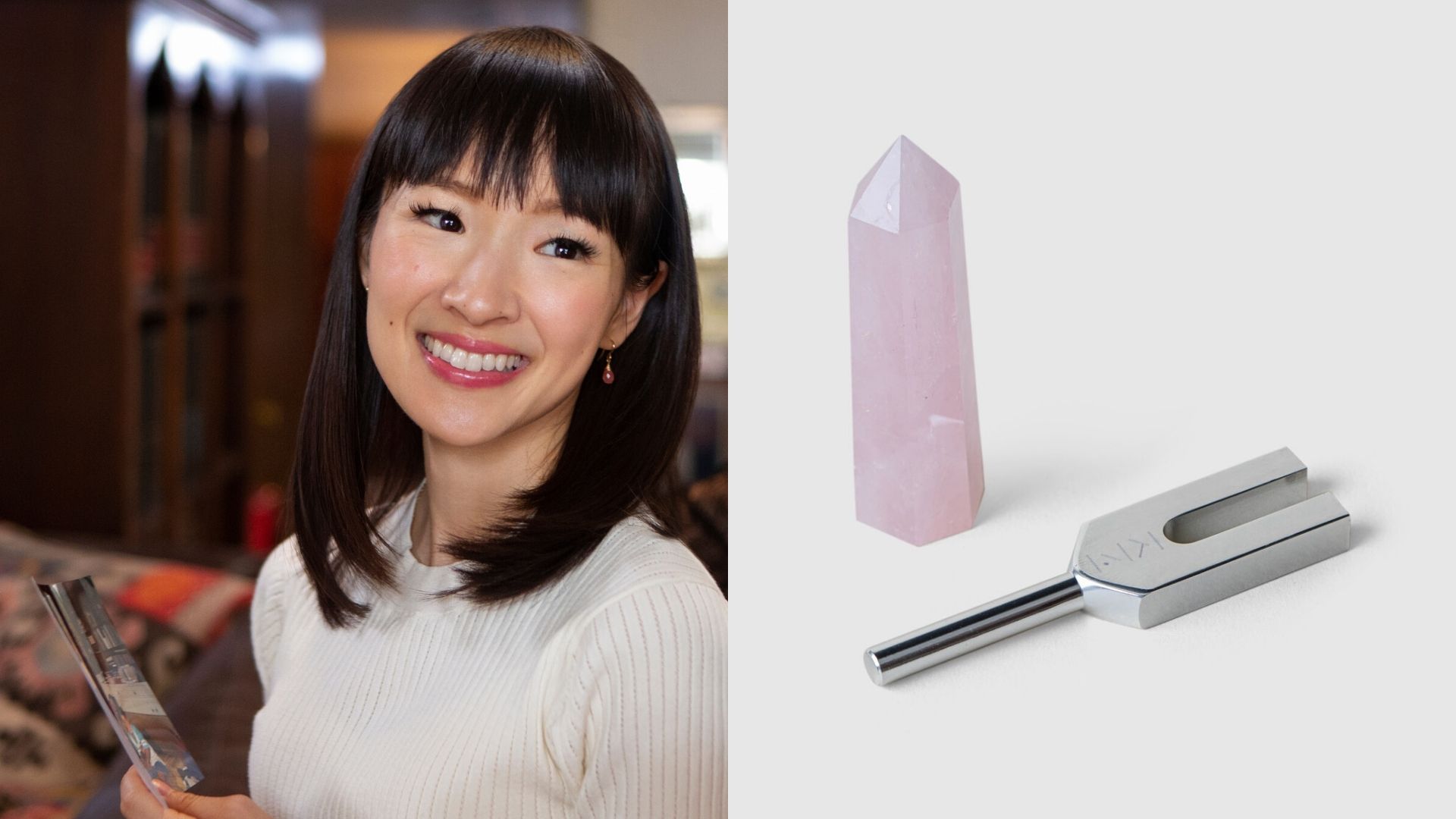With Her New Shop, the Racist Backlash to Marie Kondo Continues

Credit to Author: Bettina Makalintal| Date: Thu, 21 Nov 2019 22:16:12 +0000
When Marie Kondo launched an online store earlier this week—which sells, for one thing, a $75 "tuning fork & rose quartz crystal set"—it inspired immediate backlash from people who'd taken the decluttering icon's message to mean tossing their all junk and somehow never accruing more.
On the surface, KonMari doesn't look terribly unlike Goop. They have similar slick aesthetics. They both sell binchotan charcoal body scrub towels, Vitruvi-branded essential oils, sticks of incense, and pieces of wood (KonMari's shiatsu sticks are for targeting sore muscles, while Goop's palo santo is for burning). Goop's crystal-infused water bottles top out at $84 for one with an amethyst core, but KonMari's sodalite, chalcedony, and quartz version goes for $98.
The most obvious response to KonMari, the store, is that Kondo's domestic decluttering was a long game plan to make people empty their shelves in order to make room for more things, purchased from Kondo herself. This has been the crux of arguments at AdAge, The Atlantic, The A.V. Club, Grist, The Outline, and The Week. To critics who've tossed around the words "scam" and "hypocritical," the implication is that Kondo doesn't necessarily care to "spark joy" so much as she wants to line her pockets, just as all celebrities do by selling their fans stuff. It's as though people have been just waiting for another opportunity to critique her, and now they have it.
In the very predictable nature of online discussion, the backlash has spurred backlash of its own. People sympathetic to Kondo suggest that critics have misinterpreted Kondo's message: as they point out, the KonMari method isn't about tossing everything willy nilly, but getting rid of things that feel superfluous. If one really focuses on Kondo's suggestion to keep only items that "spark joy," some have added, the store's collection of Kondo-approved joy-bringing things follows exactly the ethos she's put forth this whole time.
Adding to the discussion are the racial nuances of the ongoing Kondo backlash, as the loudest critiques of the KonMari store and of Kondo herself have seemingly come from white Americans. Of course, those same people criticize Gwyneth Paltrow for Goop, but in addition to shilling expensive, sometimes useless stuff, Paltrow also creates a platform for unchecked and problematic pseudo-medical advice. The main thing Kondo's known for, meanwhile, is suggesting that people consider whether their messy pile of books needs to be so big. The two aren't the same, yet the anger is similar.
Through that lens, the pushback to the KonMari shop seems owed, at least in part, to the fact that Kondo is a Japanese woman who dares to build a global empire. As far back as 2016, writer Taffy Brodesser-Akner noted "aggressive xenophobia and racism" surrounding Kondo at a conference for professional organizers, where attendees had vocal disdain for the new organizing star and saw her as a "Japanese interloper," in Brodessor-Akner's words.
After Netflix released Tidying Up with Marie Kondo in January of this year, to behest of hoarders and book collectors across the U.S., the Japanese American author Margaret Dilloway wrote the HuffPo piece "What White, Western Audiences Don’t Understand About Marie Kondo’s Tidying Up." It argued that Kondo's American critics are short-sighted in part because they ignore the Shinto roots of Kondo's teachings. To Dilloway, the beliefs of the Japanese religion were clear in acts like thanking objects "for their service," which makes sense given that before writing The Life-Changing Magic of Tidying Up, Kondo spent five years working in a Shinto shrine. There is certainly also an element here of Kondo selling products rooted in her own culture, whereas Goops shamelessly cribs from Japanese, Ayurvedic, and indigenous practices wholesale.
Dilloway wrote then that she "had never seen quite this level of concentrated venom directed toward a self-help/home decor person," even taking Martha Stewart and Girl Wash Your Face's Rachel Hollis into account. This she attributed to Kondo's role as a woman of color breaking from societal rules, as well as to the notion that white, Western people feel their values threatened by Kondo's guidance. Writer Muqing Zhang shared similar thoughts in Paper, claiming that the critiques of Kondo are rooted in her "reminding white people of their own stress surrounding their first world economic anxieties and destructive capitalist consumption."
A controversial tweet from author Barbara Ehrenreich a few weeks later added weight to those critiques. In part, Ehrenreich's tweet read, "As for her language: It’s OK with me that she doesn’t speak English to her huge American audience but it does suggest that America is in decline as a superpower." (Later, she called this an attempt at "subtle humor.")
"Sure, nobody should fault Kondo for being a capitalist," wrote The A.V. Club in reference to the KonMari store. In a post-Fyre, post-Silicon Valley start-up world, there are a lot of scams and a lot of people trying to sell us questionable stuff. But when there are so many scammy millionaires and scammy billionaires, so many of whom have the privilege of being white Americans, it's worth questioning why so much anger and hand-wringing is focused on Kondo, no matter how many $24 "crumb brushes" she might sell online.
Ultimately, what the conversation around the KonMari store asks is who do we, as Americans, deem as acceptable of taking advantage of capitalism? It seems one woman's face is a lot easier for people to accept than another.
This article originally appeared on VICE US.